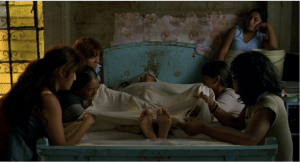Cultural Heritage of Latin America
“Politics of Life and Death in Latin American Literature and Film”


Life and death have been key concepts for the social organization of all civilizations. In Latin America, for example, the concept of death and afterlife became an element of contention between Pre-Colombian cultures and European colonizers.
Death was also a recurrent topic during the Romantic Period (XIX century,) when authors were often inspired by topics of love and nationalism. Later, in the popular literary movement known as the Latin American Boom (1960s-1970s,) led by writers such as Gabriel García Márquez (Colombia,) death and the supernatural were often employed as vehicles to address and represent political turmoil, racial oppression, and economic crisis. These concerns are also present in films set in the 1980s and 1990s, where the directors address (directly or indirectly) histories of dictatorship, genocide, civil war, or violence.
In this class we will examine how the topics of life and death can illuminate a discussion of the concerns, historical events, and political contexts of different parts and social groups of Latin America. We will focus on the following question: How do stories of life and death speak about: social values; gender, sex, and class struggles; and multicultural identities, through Latin American literature and film? Students will analyze a variety of literary and non-literary texts: novel [Juan Rulfo’s Pedro Páramo (Mexico), Maria Luisa Bombal’s La amortajada (Chile),] film [Claudia Llosa’s La Teta Asustada (Perú,) Andrés Wood’s Machuca (Chile),] poetry [César Vallejo’s “Los heraldos negros” (Peru),] and short story [Emilio Díaz Valcárcel’s “La muerte obligatoria” (Puerto Rico.)] Cultural materials such as media, art, advertisement, photography, and cartoons will sometimes inform class discussions.
- Pre-requisite: Spanish 250
- Counts as a “Focus on Latin America” course